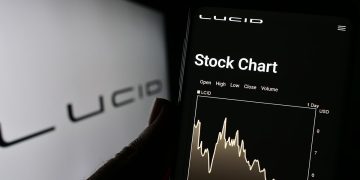TLDR
- Lucid stock rose 5.48% to $2.40 after Morgan Stanley upgraded the stock from Sell to Hold
- The company’s new Gravity SUV, priced at $94,900, is viewed as a potential turning point
- Lucid delivered 10,241 vehicles in 2024, up 71% from the previous year
- The company has about $6.1 billion in liquidity, enough to fund operations into late 2026
- Saudi Arabia’s Public Investment Fund owns about 58.8% of Lucid through a subsidiary
Lucid Group, the luxury electric vehicle manufacturer, saw its stock price rise 5.48% to $2.40 on Friday, March 21, 2025. The jump followed Morgan Stanley’s upgrade of the stock from Sell to Hold, citing a more balanced risk/reward profile and potential benefits from artificial intelligence integration.
The EV maker has positioned itself firmly in the premium segment of the electric vehicle market. Its lineup includes the Lucid Air Pure, which offers 430 horsepower and a 420-mile range at a starting price of $69,900.
For customers seeking higher performance, Lucid offers the Grand Touring and Sapphire models. These premium options come with impressive capabilities but at much steeper prices of $110,900 and $249,000, respectively.
Lucid’s fourth-quarter earnings results exceeded analyst expectations. The company reported revenue of $234.5 million, beating the projected $211.77 million. Its loss per share was $0.22, better than the expected $0.28 loss.
Vehicle deliveries have shown strong growth over the past year. Lucid closed 2024 with 10,241 vehicle deliveries, representing a 71% increase from the previous year.
Gravity SUV
The company is preparing to launch its long-awaited Gravity SUV. Priced at $94,900, the premium SUV boasts a 450-mile range on a single charge and fast-charging capabilities that allow it to gain 200 miles of range after just 12 minutes of charging.
Analysts at TD Cowen believe the Gravity could be “a turning point for the company.” However, they also expressed concerns that the price “strikes us as too high” and that Lucid might struggle to generate sufficient sales volume.
Recent leadership changes have added another layer of uncertainty. CEO Peter Rawlinson recently stepped down, with Chief Operating Officer Marc Winterhoff named interim CEO.
Bank of America analysts suggest this move is “much more consequential than understood by the market.” They warn that product development could stall and demand may be negatively impacted, leading them to cut forecasts for future production volumes.
Challenging Financial Position
Despite impressive technology, Lucid’s financial situation remains challenging. The company has posted a net loss of $8.5 billion over the past three years, making it a risky investment option today.
Lucid has raised significant capital to fund its operations. This includes $8.9 billion from the Public Investment Fund of Saudi Arabia, which now owns about 58.8% of the company through its subsidiary, Ayar Third Investment Company.
The company has also tapped into equity markets several times. These capital-raising efforts have led to severe shareholder dilution, with outstanding shares increasing from 1.62 billion in 2021 to 3.03 billion currently.
Stock Price
Lucid’s stock has experienced a dramatic decline from its peak of $57.75 per share to its current price of $2.40, representing a 96% drop. Despite this fall, the company maintains about $6.1 billion in liquidity, enough to fund operations until the second half of 2026.
The broader EV market offers significant growth potential. According to PwC projections, the number of electric vehicles in the U.S. could grow to 27 million by 2030 and 92 million by 2040.
Competition in the EV sector remains intense. Tesla continues to dominate the market, while other manufacturers like Rivian Automotive are emerging as formidable competitors. Lucid hopes its premium brand positioning will help it secure a niche among luxury EV buyers.
Political Factors
Political factors add another layer of uncertainty for Lucid and the broader EV industry. The Trump administration recently ordered the federal government to sell 25,000 EV chargers. There are also concerns about the future of the $7,500 EV tax credit and other subsidies.
Morgan Stanley analyst Adam Jonas, who upgraded the stock, highlighted Lucid’s potential to leverage its technology in strategic partnerships, particularly in AI-powered autonomous driving. He also noted benefits from the company’s local manufacturing approach and close ties to Saudi Arabia.
Despite the recent positive news and stock price increase, Lucid continues to face fundamental challenges. The company must scale production, manage costs, and make progress toward profitability to sustain any long-term recovery in its stock price.

















